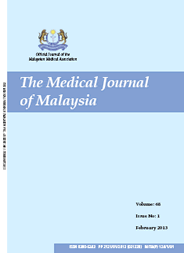MJM, Vol 70 Supplement 1 September 2015
Psychometric properties of the Malay version Organisational
Justice Scale Questionnaire
Department of Social and Preventive Medicine, University of Malaya, Kuala Lumpur
ABSTRACT
Introduction: Organisational Justice (OJ) describes the role of fairness experienced by workers and their perception of impartiality at their workplace. Perceived impartiality is now acknowledged as an important psychosocial predictor of health. The Organisational Justice Scale Questionnaire (OJSC) has 18 items categorised into three sub-scales namely: Procedural Justice (PJ), Distributive Justice (DJ) and Interactional Justice (IJ). This questionnaire has been translated into the Malay language and used among Malaysian manufacturing workers; however its psychometric properties have not been tested. The objective of the study is to examine the psychometric properties (internal consistency, dimensionality and test-retest reliability) of the Malay version of OJSC among secondary school teachers.
Method: This was a cross-sectional study conducted in 11 secondary schools in Kuala Lumpur. All tenured teachers were invited. The questionnaire was self-administered twice at an interval of two weeks. A total of 181 teachers filled in the first questionnaire while 137 teachers returned the second questionnaire. Internal consistency and dimensionality was assessed using Cronbach’s alpha and factor analysis respectively. Test-retest reliability was then assessed using Intra-Class Correlation (ICC) coefficient.
Results: The internal consistency, Cronbach’s alpha values for PJ, DJ and IJ were 0.83, 0.87 and 0.94 respectively. In the correlation matrix, all items had acceptable to good correlation with other items within each sub-scale, ranging from 0.3 to 0.9. The Kaiser-Meyer-Olkin measure (0.86) and Bartlett’s test of sphericity (<0.001) indicated identity matrix can be ruled out. In the factor analysis, all items fitted well in each sub-scales with the average variance explained for PJ, DJ and IJ to be 50.7%, 61.6% and 80.5% respectively. The ICC values for each subscale were more than 0.9 indicating excellent reliability.
Conclusion: The Malay version of the OJSC demonstrated good psychometric properties.
Keywords: Organisational Justice Scale Questionnaire, reliability, factor analysis
